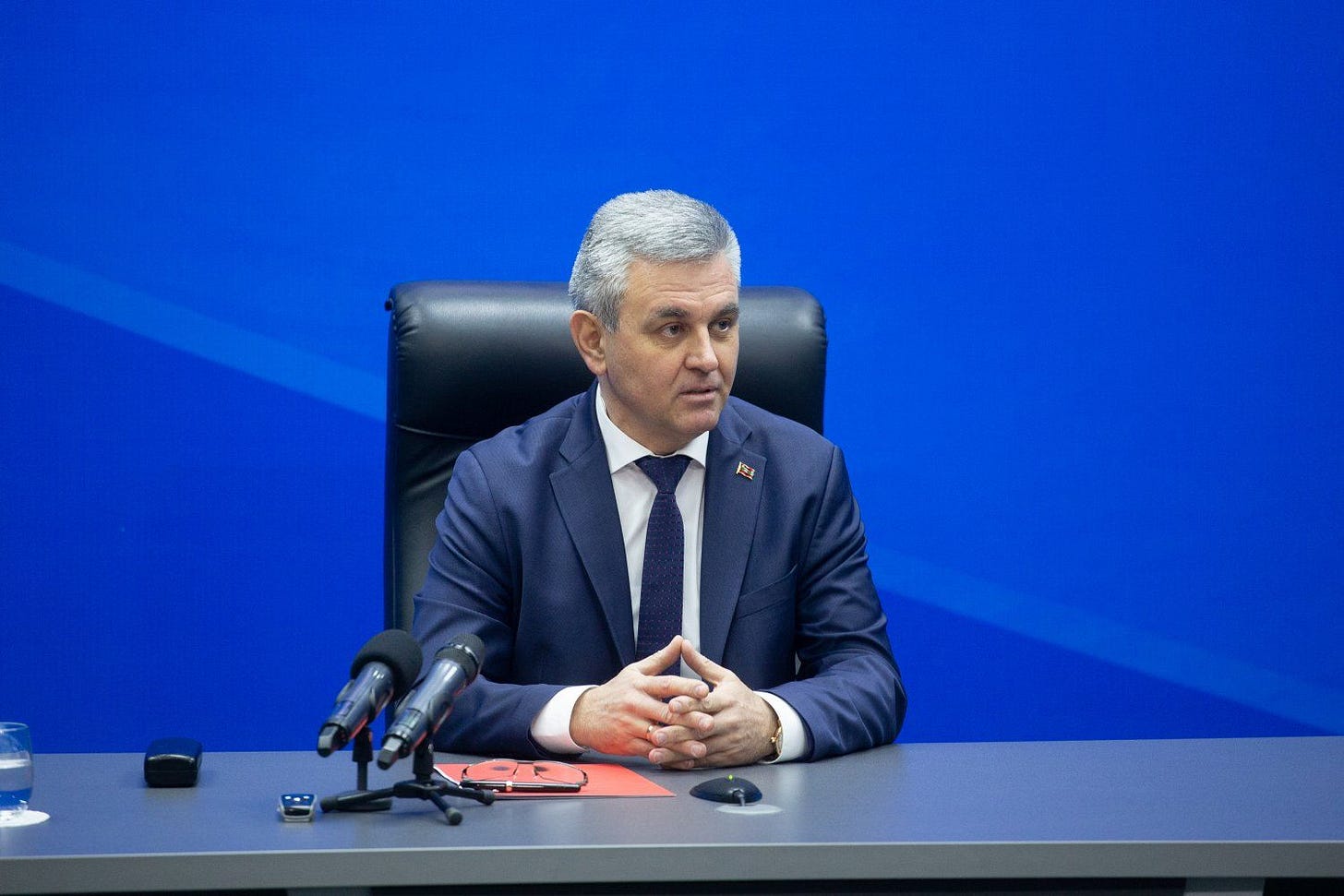This morning, Transnistrian “leader” Vadim Krasnoselsky gave a press conference following a trip to Moscow where he stated that Russia will soon resume energy supplies to the breakaway region. He said that following talks with the Russian Ministry of Energy the issue is in the process of being resolved and that gas will be provided in the form of “humanitarian assistance.”
According to Krasnoselsky enough energy will be provided for “the needs of Transnistrians” and for the functioning of their economy. This was understood to mean that gas would be provided for heating, thermal energy production and for the use of the region’s industry - but not for producing electricity for export to Moldova. This was not stated directly but implied by the region’s “authorities.”
While no concrete timeline was presented he stated that “we only have to endure a little bit longer."

A “Clandestine” Trip to Moscow
Krasnoselsky’s trip to Moscow had not previously been announced and was first reported by Zona de Securitate yesterday on January 14th. On January 10th Krasnoselsky departed the Chisinau airport on a flight to Istanbul using his Russian passport.
The Transnistrian “leader” is not a Moldovan citizen and has no residence permit or right of entry into Moldova. This quickly led journalists to the conclusion that a political decision had to have been made to let him pass through.
This was then confirmed by President Sandu following a meeting of the Supreme Security Council focused on the energy crisis. She stated:
"I know about Krasnoselski's visit to Moscow. It is further proof that Chisinau is not an impediment in identifying a solution. We want the people on the left bank of the Nistru River to have electricity, heat, and water as soon as possible. And if this visit solves the problem, then let it solve it."
The President went on to outline how Chisinau and Kyiv have repeatedly offered Transnistria humanitarian aid, support in purchasing gas and support for critical institutions such as hospitals. She stressed that this was all rejected or the acceptance of aid was preconditioned on Moldova changing elements of its policy towards the region’s financial institutions - aka unrelated topics. President Sandu stated:
"This is not Tiraspol's refusal, but the Kremlin's. Tiraspol is not deciding whether it can accept this aid or not. It is absolutely clear that the Kremlin is behind this irrational refusal,"
She went on to stress that "This is not an energy crisis” but a political one since gas can be (and it seems will be) supplied anytime the Kremlin wants to.
What’s Next?
While we don’t have a concrete timeline for the resumption of gas to Transnistria the date that everyone is watching is January 20th. This date has appeared again and again in Transnistrian plans with some assumption that energy will be restored by then. The return to school, etc on the 20th has not been explained but now seems to basically align with Krasnoselski's statements. In the meantime rolling blackouts continue with Transnistria announcing that from January 15th - 20th they will last 5 hours / day.
While the flow of gas to Transnistria will help the region’s humanitarian and economic crisis it is not expected to resume the supply of electricity to Moldova. On Monday Energocom announced that they had failed to secure enough energy capacity for the country on Tuesday January 14th. This was solved overnight with the support of Romania and Ukraine in finding unused capacity. Importantly, a shortage like this is contractual not technical - meaning that if they didn’t find the power the lights would stay on. The issue is that Moldova would be drawing on un-contracted electrical supplies triggering emergency purchases at substantially increased prices.
All of this highlights the fact that while the energy crisis in Transnistria may be nearing its end, the crisis in Moldova is not. Increased electricity prices came into effect on January 10th and the Ministry of Energy and state companies are continuing to scramble to purchase power day to day. Without a long term solution the situation will remain unstable. Even with a long term solution, prices for energy may have permanently increased as Moldova is finally fully independent from Russian energy.
We’ll return to this topic in the Weekly Roundup and follow the reactions to this news and what next steps the government is planning.




Really interesting and important stuff.
It occurs to me though, that is Transnistria doesn't get enough to sell energy to Moldova, their economy will take a substantial hit, from a weak starting position. Or maybe i overestimate the amount involved?
It would be interesting at some point top see an analysis of what happens if/when Transnistria collapses.
Come o that, given the increasing number of serious commentators, (Including London's Financial Times), saying Russia's economy will probably collapse this year, what the impact of that would be.